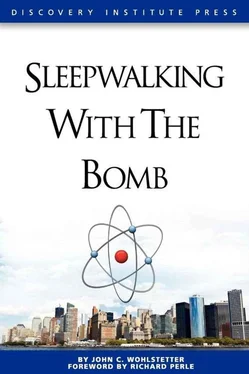John Wohlstetter - Sleepwalking with the Bomb
Здесь есть возможность читать онлайн «John Wohlstetter - Sleepwalking with the Bomb» весь текст электронной книги совершенно бесплатно (целиком полную версию без сокращений). В некоторых случаях можно слушать аудио, скачать через торрент в формате fb2 и присутствует краткое содержание. Город: Seattle, Год выпуска: 2012, ISBN: 2012, Издательство: Discovery Institute Press, Жанр: История, military, Политика, Публицистика, на английском языке. Описание произведения, (предисловие) а так же отзывы посетителей доступны на портале библиотеки ЛибКат.
- Название:Sleepwalking with the Bomb
- Автор:
- Издательство:Discovery Institute Press
- Жанр:
- Год:2012
- Город:Seattle
- ISBN:978-1-93659-906-6
- Рейтинг книги:3 / 5. Голосов: 1
-
Избранное:Добавить в избранное
- Отзывы:
-
Ваша оценка:
- 60
- 1
- 2
- 3
- 4
- 5
Sleepwalking with the Bomb: краткое содержание, описание и аннотация
Предлагаем к чтению аннотацию, описание, краткое содержание или предисловие (зависит от того, что написал сам автор книги «Sleepwalking with the Bomb»). Если вы не нашли необходимую информацию о книге — напишите в комментариях, мы постараемся отыскать её.
RICHARD PERLE, Resident Fellow, American Enterprise Institute and Assistant Secretary of Defense, 1981–1987 Sleepwalking with the Bomb
Sleepwalking with the Bomb — читать онлайн бесплатно полную книгу (весь текст) целиком
Ниже представлен текст книги, разбитый по страницам. Система сохранения места последней прочитанной страницы, позволяет с удобством читать онлайн бесплатно книгу «Sleepwalking with the Bomb», без необходимости каждый раз заново искать на чём Вы остановились. Поставьте закладку, и сможете в любой момент перейти на страницу, на которой закончили чтение.
Интервал:
Закладка:
The North, for its part, committed to (1) remain within the regulatory regime of the treaty, (2) allow inspections of its nuclear plants pursuant to the treaty’s rules, (3) implement jointly with South Korea denuclearization of the Korean Peninsula, and (4) participate in a North-South dialogue.
The North, needless to say, did not do any of these things. In October 2002 it told U.S. negotiators that it had a nuclear weapon (the North denies having said this). In December, it expelled inspectors, and two weeks later announced it was withdrawing from the Non-Proliferation Treaty. In August 2003, after the North’s withdrawal became effective, the UN Security Council tried to calm the situation by convening six-party talks with the United States, Russia, China, and Japan, in addition to the two Koreas. In October 2006 North Korea exploded its first nuclear weapon in an underground test. The only known route to produce a North Korean bomb was to reprocess spent fuel from a commercial uranium reactor and extract the plutonium by-product. But in May 2010 Pyongyang revealed a previously undisclosed uranium enrichment plant. This plant gave the country a direct route to uranium nuclear bombs, easier to make than plutonium ones.
As former vice president Dick Cheney notes in his memoir, In My Time, U.S. intelligence concluded that North Korea likely had begun cooperating with Syria in nuclear matters as early as 1997. This is further evidence that the North had violated its 1994 Agreed Framework deal with the United States. Cheney notes that Pyongyang followed a pattern of making, then breaking deals; of threatening dire consequences if not offered more concessions, then winning more concessions—all without moderating its behavior. At a January 16, 2007, meeting, Cheney reports, American diplomats treated their North Korean counterparts to a lavish dinner and offered concessions. One delegation member summed it up perfectly: “We pulled out all the stops because we wanted to demonstrate that we were serious and sincere.” That the United States proceeded this way without asking similar proof of North Korea’s sincerity speaks volumes about the effectiveness of the “negotiations.”
Attempts to coerce the North into ending its nuclear program—the Security Council’s resolutions, the United States’ targeting of North Korean trade and finances (including restrictions on trade in embargoed goods and freezing of key officials’ assets)—have all failed. Meanwhile, the North seriously escalated the Korean Peninsula crisis in 2010, sinking a South Korean ship without provocation and shelling a small island controlled by the South, equally without provocation. However, when South Korea responded with military moves and threatened to use force, the North retreated.
The North did not simply pursue its own nuclear program. It entered into the shadowy network set up by renegade Pakistani nuclear scientist Abdul Qadeer Khan, which distributed nuclear technology until Khan’s cover was blown and it was shut down. It has closely cooperated with Iran, helped the now defunct Libyan program, and built the partially completed nuclear plant in the Syrian Desert that Israel destroyed on September 6, 2007. Its latest effort, according to some Western intelligence sources, is a venture with Burma to build a nuclear plant to make fuel for either North Korean or Burmese bombs. Burma also reportedly plans to ship yellowcake uranium—a powdered, partially processed uranium ore—to Iran, which has the facilities to further enrich the yellow-cake.
Not stopping there, the North is working on its ballistic missiles. In 2009, it fired a test shot in the direction of Hawaii, passing over Japan en route. One North Korean model, the TD-2, reportedly has a planned design range of 9,300 miles when operational. At that distance it could hit anywhere in the 50 states. Recent large-rocket test failures suggest, however, that it could be several years before the U.S. will be in range of the North’s operational rocketry.
Today’s Korea: The Perils of Regime Change
THE DECEMBER 2011 death of Kim Jong-Il creates new uncertainty about the North’s future. The North Korean people surely want change, but they face a heavily armed police state. Western sanctions are riddled with loopholes. Can positive regime change happen?
Third son Kim Jong-Eun, designated “Great Successor,” is apparently but a figurehead, with one or more relatives ruling as regents, so to speak. He is young (about 28) and has lived much of his life in Japan—not a plus to Koreans, whose national memory includes a brutal Japanese occupation of the Peninsula from 1910 to 1945 and especially brutal treatment during World War II. Lacking the careful grooming the regime’s founding ruler gave his son, Kim Jong-Eun depends upon the loyalty of his Praetorian Guard. The praetors —elite guards of the Roman Emperor—were known at times to turn on their ruler. Modern editions can play much the same role; should inner-circle loyalties shift, regime change could come from within. While Kim Jong-Il took steps to purge possibly disloyal elements, there is no assurance that such steps will succeed in protecting his son. With neither his grandfather’s charismatic authority nor the training his grandfather gave his father, Kim Jong-Eun is vulnerable. That Kim Jong-Il designated his successor only in September 2010, two years after he had suffered a major debilitating stroke, made his pick less likely to be accepted. Successors in dictatorial regimes must be chosen when the leader in place has full power to command allegiance from potential rivals. Callow youth is moreover hardly likely to be trusted as sole custodian of the nuclear car keys.
For the foreseeable future the successor regime will remain a dictatorship, likely a brutal and dangerous one. The possibility that such a change instead could prove beneficial hinges on whether the new regime eventually surrenders its nuclear program in exchange for better political and economic relations with the West. There is no present indication that such a shift is in the cards.
There is one long-shot possibility from outside: the Chinese can easily topple the regime. China supplies about 90 percent of the North’s energy needs. An energy cutoff would sink the state within months. But China has at least two reasons not to proceed this way.
First, China only lightly polices its 843-mile border with North Korea. The fall of Stalin’s Frankenstein’s monster would leave starving millions fleeing northward across the porous border, entering provinces where the ethnic makeup differs from that in the rest of China, and thus where the risk of increased unrest after a refugee influx is real. The country that built the world’s longest and most famous wall (the Great Wall is 4,200 miles, five times longer than its Korean border) could build a security fence, but so far China has not done so.
Second, China benefits from the North being a major thorn in the Western-Asian alliance. North Korea ties up South Korea’s military forces, along with some 28,500 American troops. The threat of a war between the two Koreas gives Western planners nightmares, especially with American military strength stretched thin around the globe. A major insurgency in Afghanistan is still winding down, and the United States has only just departed Iraq. Troops brought home will need extensive recuperation and rebuilding before being deployable again.
But these problems are only minor in comparison with the problems a preemptive strike would face. North Korea’s conventional military arsenal is in itself a major threat to the South, but its nuclear component confers substantial immunity from preemptive attack. Nor is a nuclear preemptive option against the North feasible. Targeting artillery along the 38th parallel would require ground-burst strikes, throwing up countless tons of intensely radioactive debris—simply unthinkable in light of the close proximity of Seoul’s 10 million people, who would be hostage to wind direction at zero hour. In addition, as Eisenhower noted, the political impact of a second nuclear use by a predominantly Caucasian country upon an Asian people would be seismic.
Читать дальшеИнтервал:
Закладка:
Похожие книги на «Sleepwalking with the Bomb»
Представляем Вашему вниманию похожие книги на «Sleepwalking with the Bomb» списком для выбора. Мы отобрали схожую по названию и смыслу литературу в надежде предоставить читателям больше вариантов отыскать новые, интересные, ещё непрочитанные произведения.
Обсуждение, отзывы о книге «Sleepwalking with the Bomb» и просто собственные мнения читателей. Оставьте ваши комментарии, напишите, что Вы думаете о произведении, его смысле или главных героях. Укажите что конкретно понравилось, а что нет, и почему Вы так считаете.












